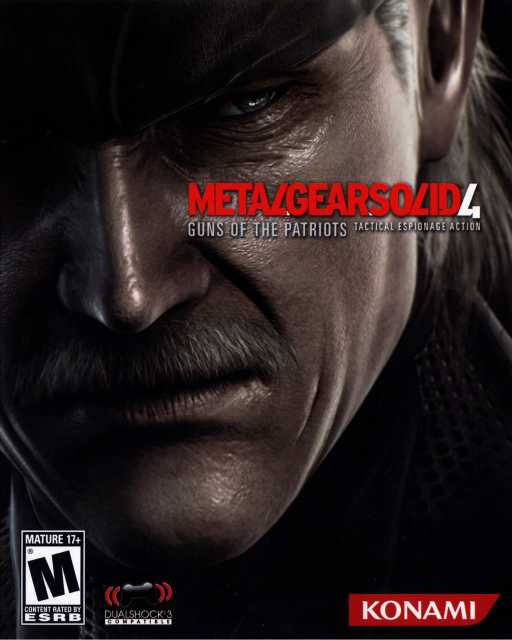This game offers just as many reasons not to play as it does to play it.
From its beginnings in 1987, the Metal Gear series has always had a notable presence in the video game community. This holds especially true for Guns of the Patriots, as it seeks to wrap up the Metal Gear storyline with one last hurrah. In this light, the Metal Gear saga ends on a rather conflicted note. After all, Guns of the Patriots is not without its flaws. The story is needlessly drawn out and has a penchant for the absurd, and many of its side features are awkward, at best. In spite of these shortcomings, this game might still be worth playing. Its story ultimately has something to offer, and the tactical stealth gameplay is essentially without flaw. For those willing to put in the effort, Guns of the Patriots rewards handsomely.
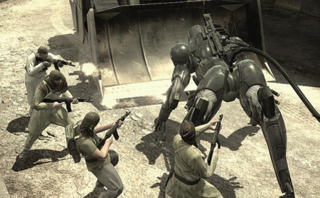
But Metal Gear Solid 4 will not make this easy, one of the reasons being its copious use of cinematics. Most of the game (perhaps more than half) consists of watching drawn out cutscenes slowly explain the story to you. While their staging is top notch, the cinematics ultimately harm the game more than they help it. Because of them, Guns of the Patriots feels like a prolonged movie rather than a game. Its attempts to reference (only reference) its gameplay systems within the cutscenes only exacerbate the problem. At times, it feels like the game forgets that the player even exists. In addition, many of the lengthy cutscenes are not even necessary. For every one cutscene that establishes well-appreciated atmosphere, another repeats things that have already been said.
Of course, this is ignoring the actual content that these cinematics present. On those grounds, the game enjoys greater success, even if it still exhibits some important flaws. The story takes place in 2014, and war has become a commodity. An aged Solid Snake must search this world for Liquid Ocelot and figure out what exactly they are planning. This story is a grand one, but it also has a penchant for the ridiculous. It will wax philosophical about the dangers of war one minute, only to pit a vampire against a robotic samurai the next. Sometimes, this works in the game’s favor. Some of the more ridiculous moments can be both hilarious and exciting. They might even make the long cinematics worth watching. But it is just as likely that they impair the story’s message. They not only remind you that you are playing a game, but also remove a lot of weight from the game’s messages. After all, it is very difficult to digest themes like the dangers of the digital age or the growing commodification of war if the story treats itself with such levels of irreverence.
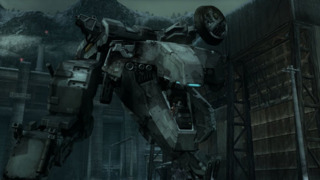
This irreverence is confusing when you consider just how much the game dotes on its main ideas. The story is pushy, yes, but it has good reason to be, at least on an ideological level. Not only does the story tackle a lot of heady topics (commodification of war, autonomy in the Digital Age, coming to terms with the past, etc.), but it also puts a great deal of thought into each one and handles them all intelligently. For example, consider how the game handles its protagonist: Old Snake. He is an outdated relic, slowly dying and clearly unfit for the situations he repeatedly encounters in his adventures. The problems facing him never go away, either; both the story and the characters populating it constantly acknowledge the myriad issues he must wrestle with. But while Snake’s flaws ultimately hold him back, he still succeeds in the end. hus, the game’s stance on autonomy ends up highly credible. More importantly, though, this treatment is not limited to this one particular topic. It’s actually typical of how the game handles all its topics. The story might not always be perfect, but it certainly has value.
Yet as strange as it may sound, the story is not the greatest reason to play Guns of the Patriots. Instead, that honor falls on the highly polished stealth gameplay. Rather than brute force your way through a given area, the game expects you to slow down and avoid enemy contact. In fact, trying to blaze through an area guns akimbo is almost always a frustrating and fruitless endeavor. However, this is precisely what makes Guns of the Patriots so enjoyable to play through. True, the game expects a lot out of its players, but rewards them just as well. Sneaking past enemy lines requires a lot of planning and attention to your surroundings (some larger areas notwithstanding), and successfully executing on that plan gives you a very strong feeling of control. Guns of the Patriots combines delayed gratification and an animalistic, predatory sense of power in the best of ways for those willing to put in the time.
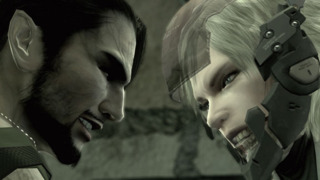
This is especially surprising when you consider the powerful tools you have to solve these problems. Powerful as they are, they do nothing to diminish the difficulty or the reward that comes with it. For instance, while Snake is equipped with a suit that can blend in with his environment, this does not negate the challenge in the slightest. Even when you are least visible, you still need to pay attention to your surroundings lest an enemy stumble upon your hiding form. Similarly, a tranquilizer gun will not get you out of every problem you face. In fact, using it incorrectly can alert enemies to your presence. There are few, if any, easy ways out in Guns of the Patriots. The game forces you to hone your skills if you want to succeed, and the experience is richer for it.
Unfortunately, as strong as Guns of the Patriots’ core gameplay is, its surrounding systems are remarkably weak. The most noteworthy example is the game’s weapon system. In addition to weapons Snake finds on the field from time to time, he can also procure new weapons through a sort of trade-in system. He can steal weapons off downed foes and trade them into an arms merchant to buy new guns or upgrade the ones he currently has. There are more caveats to this system, but the game never provides much reason to explore those caveats. Success in this game depends on avoiding conflict wherever possible, and much of the time, this means not using any weapons at all. Even if you need to use a weapon, a simple tranquilizer dart will usually suffice, as it is far more versatile than any other weapon you encounter. In short, the weapon system in Metal Gear Solid 4 runs counter to what the game encourages, making its inclusion and emphasis baffling, to say the least.
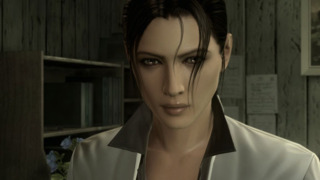
Their only real utility is during the fights against the members of the Beauty and the Beast Unit, which are arguably some of the lower points in the experience. Where the bulk of Guns of the Patriots’ gameplay is graceful and methodical, the fights with the B&B Corps are clumsy and difficult to enjoy. Rather than emphasize stealth, these fights focus more on action, and while the game can handle action, it cannot do so for very long. The fights against the B&B Corps stretch the limit, resulting in plodding fights where both parties clumsily exchange blows until one of you eventually dies. Not even the narrative can justify their presence. Each member is essentially the same character, and they are only barely relevant outside these encounters. They only exist for you to kill, not to enhance your enjoyment of the game.
Ultimately, Guns of the Patriots is a conflicted experience, no matter how you look at it. If judged in narrative terms, then the game must balance both dreadfully long cutscenes and a gleeful sense of stupidity with many well realized themes and an attention to detail. If judged in mechanical terms, on the other hand, it must now balance flimsy side systems with a highly solid stealth core. Metal Gear Solid 4 is not for everybody; it will turn away just as many players as it attracts. Those willing to put in the work to look past the game’s flaws, though, will almost certainly find a game worth playing.
